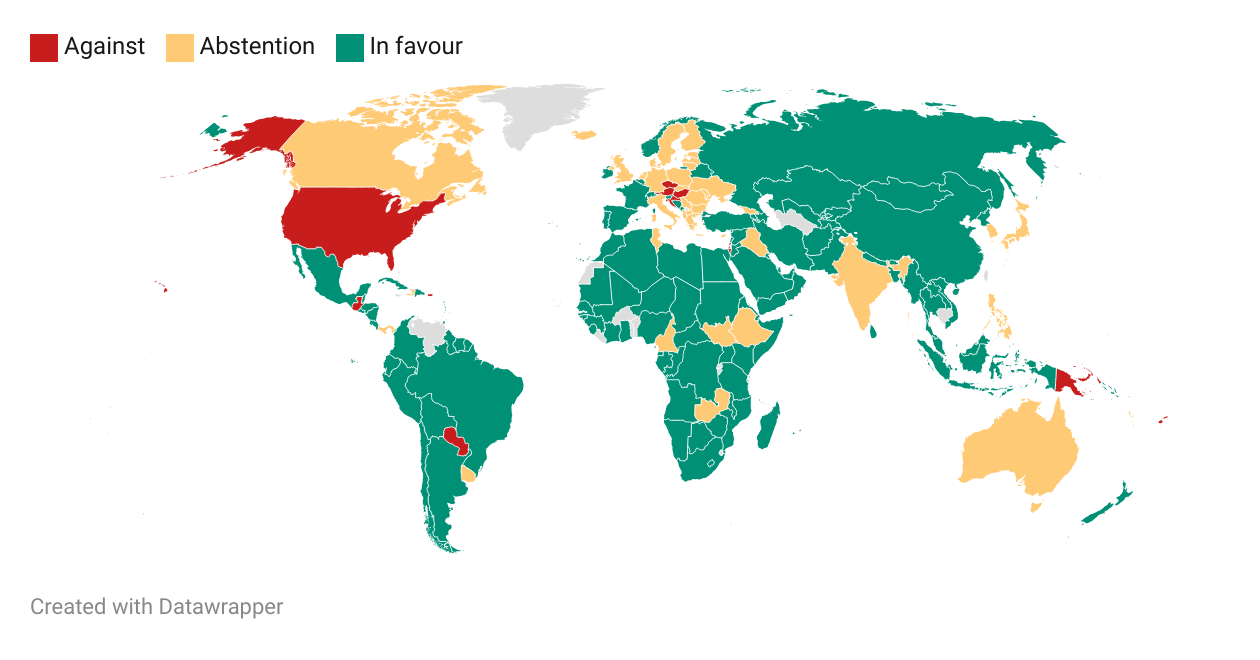 pancake
Now
•
100%
pancake
Now
•
100%
From what I recall, register is ignored by modern compilers (it used to mean that you wanted the variable stored inside CPU registers, but nowadays compilers are smarter and know when to do that). Meanwhile, static is basically a global variable that has the scope of a local variable, while extern is a global variable that you want to explicitly tell the compiler it's defined in a different compilation unit.
 pancake
Now
•
100%
pancake
Now
•
100%
Thank you for the advice! I have some green tea lying around at home somewhere, it's been literal years since I last had it lol. It's definitely time.
 pancake
Now
•
100%
pancake
Now
•
100%
I guess we could make one using newer FHE-RAM techniques and some edge case handling.
 pancake
Now
•
100%
pancake
Now
•
100%
It's been my 11th week in a row working out for 1 hour or more at least 4 days a week, as well as my 10th week doing at least half an hour of French and German lessons every day. 3rd week in a row studying medical literature at least 2 hours a day Monday to Saturday.
My plan for October is to engage in party activities for an ongoing campaign, as well as try to consolidate my studying routine. In November, I will reduce workout time to 3 days per week, and not go much over an hour each day (currently I spend about 1.5 - 2 hours), so I can focus more on medical literature and improve fast on that front.
So far off drugs (except caffeine and some alcohol) for 3 months, psychologically stable (I think?). Will quit coffee starting in February, or sooner if I become unstable again before that.
 pancake
Now
•
100%
pancake
Now
•
100%
Cool! Is that your own conlang?
 pancake
Now
•
100%
pancake
Now
•
100%
Now I feel the obsessive urge to resume working on my conlang. Productivity sucked away for weeks :(
 pancake
Now
•
100%
pancake
Now
•
100%
We can't know how medicine would be practiced under socialism, but we do know that our bodies would be the same. Cancer wouldn't be any different. Maybe there would be less cases of lung cancer, and maybe treatments would be less expensive or would be found earlier. Maybe we'd find the cure for all types of cancer simultaneously. But the limitations imposed by the nature of disease itself wouldn't change.
 pancake
Now
•
100%
pancake
Now
•
100%
Capitalism always favors non-curative treatments over curative ones, and makes newer curative treatments extremely expensive (e.g. CAR-T cell therapies or genetic treatments).
But, as other users rightly point out, there are millions of ways our bodies can misbehave. Even something like "cancer" is just an array of several hundred diseases, wherein even each of them is not homogeneous across all cases. Cancer survival slowly goes up over the years as specific variants of it are tackled, but that wouldn't be different under socialism, at most just faster (Cuba has made some great contributions to cancer research) or more accessible.
 pancake
Now
•
100%
pancake
Now
•
100%
I should say this to people who claim "capitalism" has nothing to do with capital and is nowadays just a synonym of freedom.
 pancake
Now
•
100%
pancake
Now
•
100%
I like this perspective of yours. I may as well expand the range of activities of mine I call hobbies.
 pancake
Now
•
100%
pancake
Now
•
100%
Rare FT "China good" moment /s
Or so it would be if people wouldn't personally relate to billionaires for some reason.
 pancake
Now
•
100%
pancake
Now
•
100%
Late-Permian extinction. Not very imaginative, but I find it cool that there are so many hypotheses even about the largest mass extinction ever.
 pancake
Now
•
100%
pancake
Now
•
100%
Cool! Books are an amazing source of knowledge and fun. I just got a (second hand) math book that another user recommended, and it's so far enthralling. Do you read Marxist books?
 pancake
Now
•
100%
pancake
Now
•
100%
Hey! Welcome aboard! :)
I'm a physician in Spain, but I like to force myself to learn new things all the time (like languages, or one time that I took up a job as a programmer). I don't really enjoy anything outside of that and sport, so I may not be of much use if you want someone to talk with about books, TV series etc.
And speaking about books, do you like reading? Is there a public library or similar in your area?
 pancake
Now
•
100%
pancake
Now
•
100%
The source is from 2019. The trend of promoting the private sector that China was following at the time has largely reversed.
Edit: tl;dr: all tools seem to be capable of 28 nm process, except the lithography machines. However, the report (why?) doesn't include the most advanced lithography tools that are known to be manufactured. 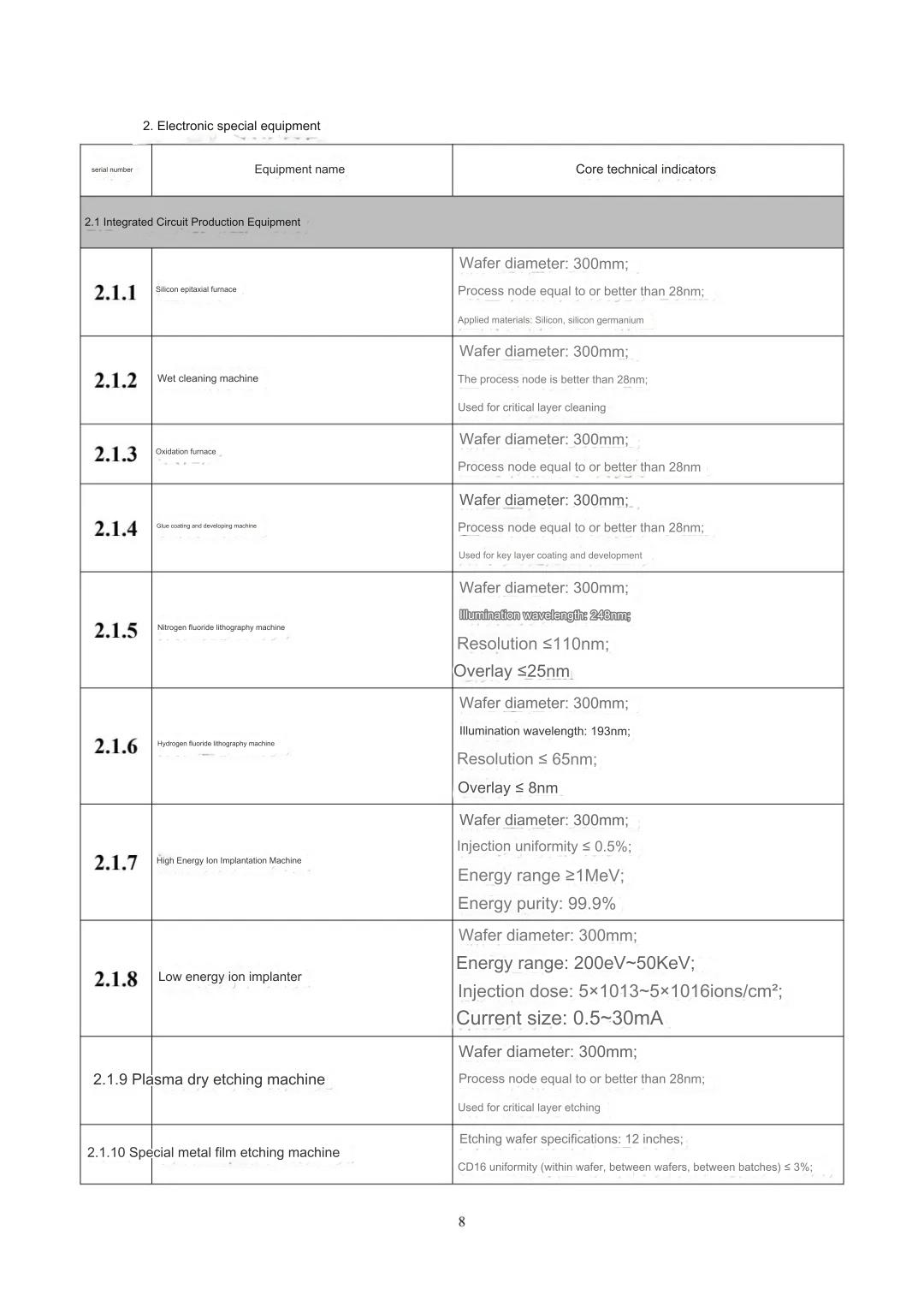 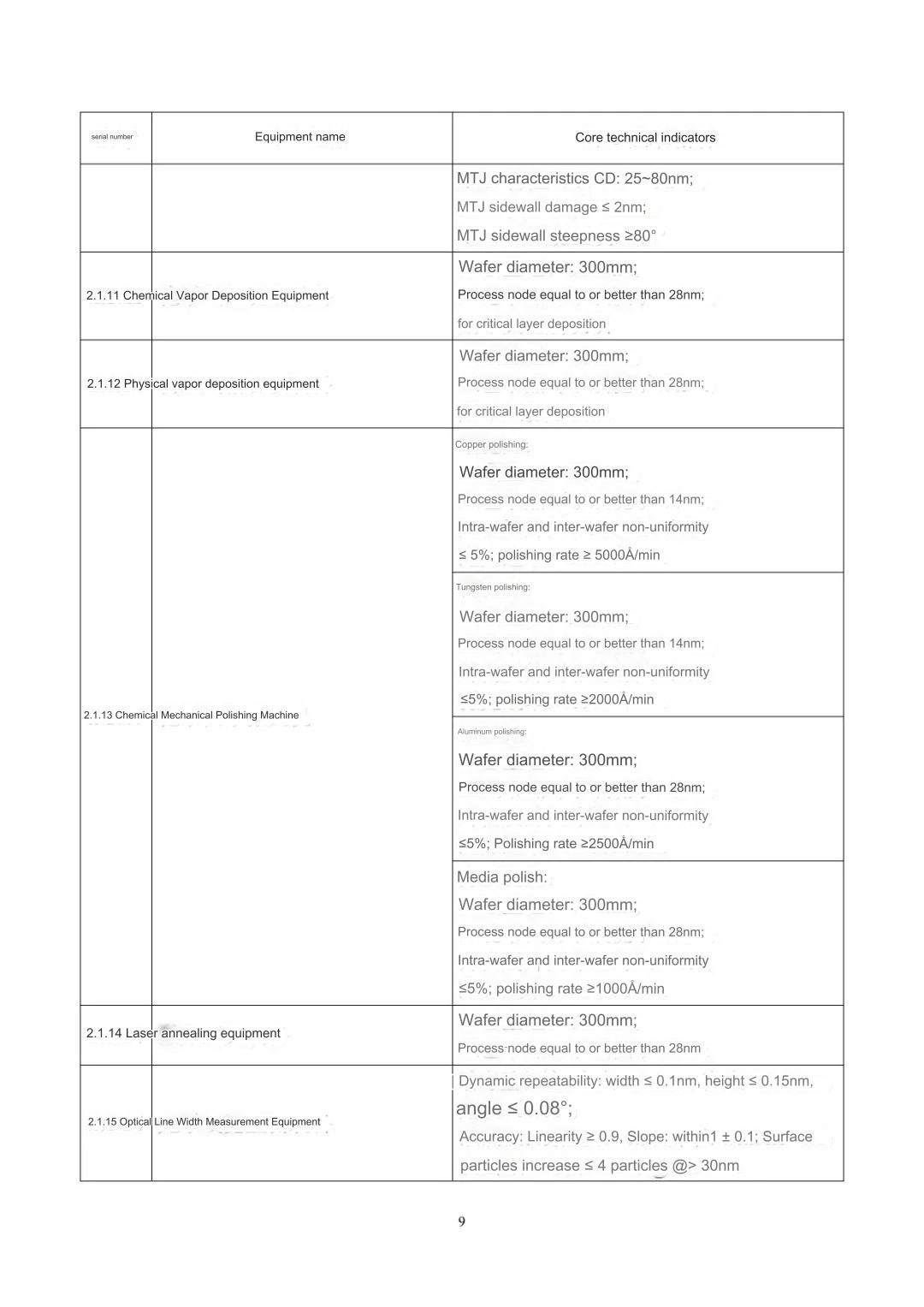 [Source](https://www.sinodefenceforum.com/t/chinese-semiconductor-thread-ii.9109/page-450)
This is a sequel to my [previous post](https://lemmygrad.ml/post/5555347). The idea is the same, but I'm using better methods as was suggested in the comments. As u/Sodium_nitride (thank you!) explained, here... - ...I use a [production matrix](https://en.wikipedia.org/wiki/Input%E2%80%93output_model) instead of the [Cobb-Douglas function](https://en.wikipedia.org/wiki/Cobb%E2%80%93Douglas_production_function). - ...I use capital-time instead of capital, to handle depreciation. - ...classes consume commodities, seeking to maximize the amount consumed. Also, I purchased the book suggested by u/davel :) We use the following definitions: - Labor is measured relative to **A**'s total labor power. - **B** has `b` labor power, assumed to be proportional to population. - Capital-time and commodities are measured in units of what can be produced directly from 1 unit of labor. - Labor sold is represented with `w`, and the salary is used to purchase capital-time `s_k` and commodities `s_c`. - Consumption of **A** is `c`, while that of **B** is `z*b*c`, where `z` is the ratio of _per capita_ consumption. Production matrix: /0 0 0\ A = |1 m 0| \1 n 0/ Input vectors: / 1 - w \ x_A = |k_A + s_k| \ 0 / / b + w \ x_B = |k_B - s_k| \ 0 / Demand vectors: / w - 1 \ y_A = | -s_k | \c - s_c/ / -b - w \ y_B = | s_k | \z*b*c + s_c/ Payoff functions: X_A = c X_B = z*c # Case 1: full equilibrium In this case, we assume that **A** and **B** can negotiate `w`, `s_k` and `s_c` freely, with no party being able to obtain a better bargaining position. The Nash equilibrium is: w = s_k = s_c = 0 c = (m - n - 1)/(m - 1) z = 1 That is, both groups are independent and produce their own capital-time and commodities. Their consumption is directly proportional to their labor power. Effectively, there is no difference between **A** and **B**, any member of either group belongs to the same class. # Case 2: asymmetric capital ownership Here, we set `k_A = s_k = 0`, so **A** owns no capital-time. **A** and **B** can negotiate `w` and `s_c` under the same conditions as in Case 1. The Nash equilibrium is: w = 1 s_c = c = (1/2)*(m - n - 1)/(m - 1) z = 2 + 1/b As can be seen, in this case **A** works for **B** and obtains a salary. Interestingly, this salary is exactly half of what **A** would have obtained in Case 1. From this and `z`'s non-dependence on `m` and `n`, we can deduce that increases in productivity scale both **A**'s and **B**'s earnings with the same coefficient, so it's impossible for **B** to force **A**'s income to any specific minimum. We also see that **B**'s _per capita_ income is higher when less people belong to the group. For a small enough group, **B**'s total income approaches that of **A**, just extremely concentrated. A plausible hypothesis here is that, if the initial situation is Case 2 but productivity is more than high enough to sustain **A**'s needs (thanks to the inevitable scaling described before), then **A** would be able to eventually negotiate their way to the final equilibrium, Case 1, provided a minimally feasible way to obtain capital. If that is the case, the (surreal, but theoretically interesting) requirements to get to the equilibrium could be summarized like this: 1. All members of **A** cooperate perfectly (obviously false). 2. **B** has no way to gain an advantage (bourgeois state in general). 3. The productive forces have developed beyond a critical point. # Further questions - How could one verify the hypothesis above? I know how to use production matrices in a state of equilibrium, but what about transient states? - What if individuals can freely move across groups as their economic status changes and so do their interests? I know nothing about cooperative game theory, so this could be an interesting start. - What if members of **A** and/or **B** do not cooperate perfectly? - What are the minimum requirements for a mechanism that could allow the cooperative result in a non-cooperative Nash equilibrium?
Today they published a new report in the series. To my surprise, it includes a second chart with revenue-based data. Enjoy!
I'm learning game theory these days, and I've tried my hand at some problems inspired by ML theory. Here's one I found really interesting. Let's assume the following (clearly unrealistic) situation: 1. Working class (**A**) and bourgeoisie (**B**) form perfectly cooperative coalitions. 2. They may negotiate salaries, with no class having any mechanism to obtain a better bargaining position. 3. **A** cooperatively owns some amount _k_ of capital, while **B** owns (arbitrarily) 1. In principle, _k_ < 1. 4. **B** has some labor power _b_, while **A** has (arbitrarily) 1. Again, _b_ < 1. 5. Production follows a [Cobb-Douglas function](https://en.wikipedia.org/wiki/Cobb%E2%80%93Douglas_production_function), where the sum of the output elasticities of capital and labor is 1. 6. Both classes consume the same proportion of their income and use the remainder to acquire more capital. Therefore, the payoffs in our problem can be stated like this (where _w_ is the labor given to **B** and _s_ is the compensation given to **A** for this labor): X_A = A k**α (1 - w)**β + s X_B = A (b + w)**β - s We would like to find how the ratio of **A**'s capital to **B**'s changes over time, so we compute its derivative using the quotient rule, and note that the proportion of income (_p_) spent on capital is the same for both classes: `R = p X_A - k p X_B` Finally, we find the Nash equilibrium and its corresponding _R_ at each combination of _k_ and _b_: 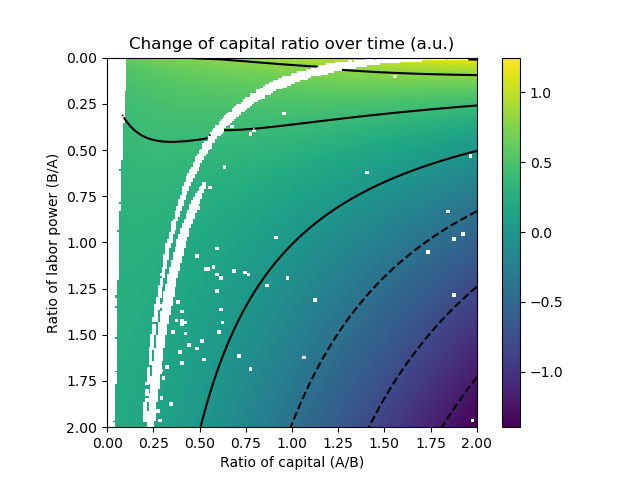 Note the attractor curve coinciding with `k = 1/b`. In other words, ~~if both _k_ and _b_ are higher than 0~~, the eventual equilibrium will be for **A** and **B** to own capital proportional to their labor power. Edit: fixed some missing solutions near `k = 0`.
I have been thinking about implementing this for quite some time, but I would like some feedback from people more knowledgeable than me on the matter. There's been some great progress in the field of Private Information Retrieval (PIR) protocols. Recently, in a 2022 article, Lin et al. describe an "updateable DEPIR", with both read and write times that can be made sublinear to database size. I wonder if one couldn't use a combination of this technique and regular public-key cryptography to provide fully anonymous message routing. One could write outgoing messages to a fixed address and issue private reads to their contacts' addresses, with the messages themselves being encrypted with the receiver's public key. The benefit of this would be a messaging protocol wherein the server wouldn't just be oblivious to the content of all messages, but also the social graph itself, plus all message-sending operations becoming deniable as a side effect.
First of all, I'm sorry if my question could be easily answered by finding the right source. Overall I'd say I read very little theory written by contemporary comrades, and that's something I need to fix once I have the time.
Remember [this post](https://lemmygrad.ml/post/4671237) (tl;dr: did an A2 Russian language examination after nothing more than Duolingo lessons for two years)? Well, I passed the tests! Performed kind of poorly in the essay, as expected, but still well enough not to hurt my overall score; spoken test went fine (to my surprise), as did the comprehension tests.

1 more year has passed, and I'm still tracking these numbers, albeit now posting with a different username. The upward tendency has not just continued, but even increased; now Linux is nearing 4 % market share globally and over 2 % on Steam.
I'm taking a CEFR A2 Russian language exam in a few minutes. Let's see if a massive Duolingo addiction is all it akes to crack it.
 datawrapper.dwcdn.net
datawrapper.dwcdn.net
I remember [this post](https://lemmygrad.ml/post/3953768) that compared the quality of life in the DPRK and the US. There are many ways in which traditional stats like the GDP per capita exhibit bias in favor of some countries; countries may differ in their... * ...distribution of wealth. * ...basic expenses. * ...cost of products and services. So, I decided to give it a shot. I started from median wealth per adult values published by UBS (data from 2022); my logic was that two people who end up, no matter their income, with the same amount of expendable income will acquire a similar amount of value in the form of equities, real estate, vehicles... By using the median value, I make sure that wealth in countries with high inequality isn't overestimated. Then, I multiplied these values by the ratio between adjusted (international dollars at 2017 prices PPP) and unadjusted GDP per capita of each country, using data from 2022 by the IMF. There are some interesting things to note within the map. Enjoy!

Two weeks ago the Human Development Report 2023/24 was published. As I did last year, here's a comparison of current and past socialist and capitalist economies' HDI (not weighed), along with the standard error of the latter group and a p-value computed via Mann-Whitney U-test. Looks like socialist countries are now (in 2022) fully on par with their capitalist counterparts. All of them except Cuba saw a sharp increase in their HDI, while capitalist countries are yet to recover from the COVID-19 pandemic and its economic consequences.
Ok, so I was reading about solarpunk and circular economy and such, and came across [this](https://en.wikipedia.org/wiki/Regenerative_economic_theory). Seems pretty reasonable, but also very vaguely worded, both by Wikipedia and the Capital Institute. I don't yet understand what they actually advocate for in terms of economic power dynamics, and I was wondering if any of you have heard of this concept before and think it's worth reading more into it. Ps. if you think it's some sort of lunatic pseudo-science please let me know, that can help me keep myself safe.
As some of you might know, I experience strong mood swings accompanied during the hyperthymic phases by delirious thoughts (technically not bipolar though, so no option for targeted treatment until it worsens, for now I only get an antipsychotic drug at low dose). I already feel a reduced need for sleep, lots of energy, etc. And I'm beginning to spend much more money than usual, making ridiculous plans, talking and writing too much and having a fast stream of thoughts involving nonsensical math, economy and science. This time I'll try to keep myself safe. So no more huge debates with libs on Reddit, no more deranged thought posts here, etc. Irl my friends and family know when to warn me.
It's really cool that the trend is going on. It's also interesting how this seems to correlate so well with inflation in the US (ignore badly applied statistical test): 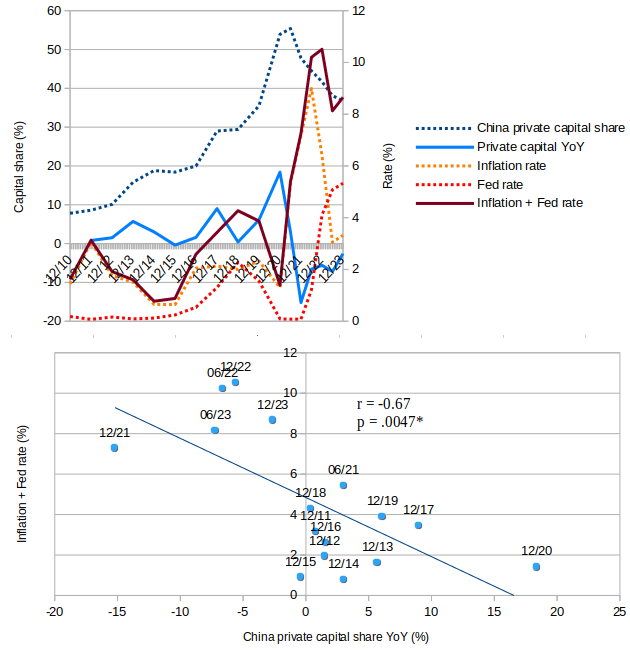 Guess that capital gotta keep expanding at all costs :)

# Methods I downloaded and used HDI values from the 2022 report, which contains data up to 1990, and values for 1975-1985 from the 2009. Then successively added any missing data from reports starting from 2008 to 1990, since some values (specifically from some socialist nations) are deleted in the latter reports. **Note that data before 1990 uses a different methodology, which explains the jagged line.** Finally, I used linear regression to complete any countries that only missed a single data point. Then, I computed the average of all capitalist and socialist countries that existed at the end of each year, and plotted it. For capitalist countries, I also plotted the standard error (it's too large to represent for socialist countries). The dashed line is the p-value computed via the Mann–Whitney U test, which is the probability (out of 1) that comparing random countries from both groups would not show any difference. That is, the closer to 0, the more likely it is that there is an actual difference between the groups. # Limitations * The HDI reports are missing lots of data, especially from the first decades. This could have been subject to selective reporting. * Means and p-value are computed without weighting by population. Either doing or not doing it may introduce different biases. * A mean might not be the best way to quantify the behavior of a wildly varied set of countries. * While the HDI is computed in such a way that taking means makes sense, there may be biases in its calculation.
This proposal involves a possible path forward towards a decentralized system offering a degree-of-belief consensus on a non-trivial subset of all natural language statements, including those about reality. Its possible uses include: * Decentralized, formally verified scientific research aggregation. * Automated literature review and meta-analysis. * Proof- and incentive-assisted debate. * Trustless fact-checking. * Decentralized governance in arbitrary contexts. The system would consist of three layers that would be designed and built sequentially, each extending the system's capabilities upon implementation: * **Layer/phase 1**: optimistic decentralized formal proof verification with reverse dependency tracking. Introduces all statements verifiable in the proof system. * **Layer/phase 2**: formal definition and implementation of "extractors" and "injectors" mapping in and out of proofs via non-L1 "soft" axioms. Increases the scope to real-world statements not depending on real-world data. * **Layer/phase 3**: incentive-based voting system for presumably non-provable statements, which would extract proofs about degree-of-belief statements and use them to update its state in a way that incentivizes informed belief. This is a draft diagram of what the first layer could look like (each bubble represents a CIC expression, including proofs): 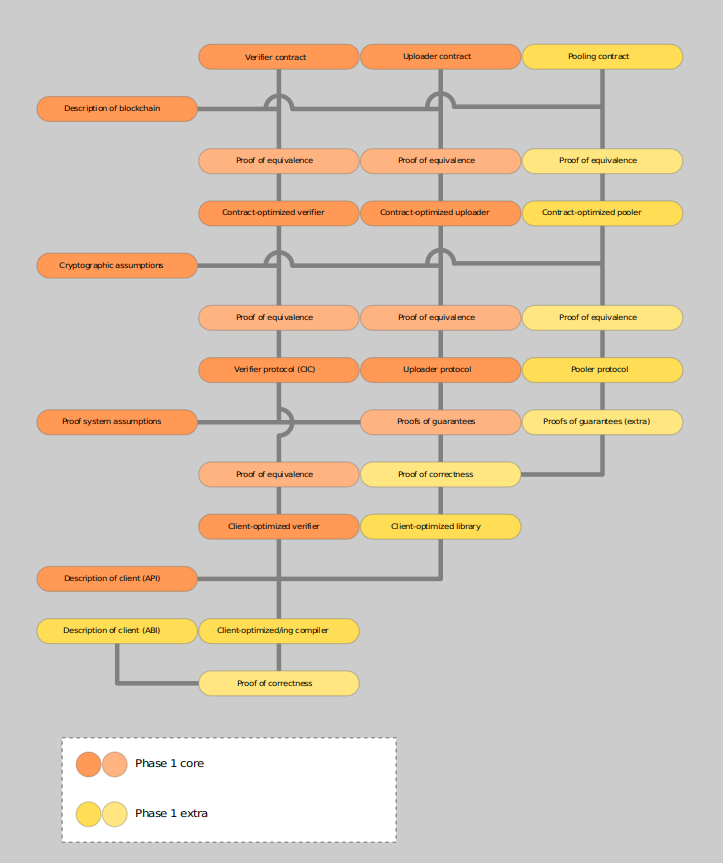 During initial testing, [Coq](https://coq.inria.fr/) could be used both for compilation of system components and verification (as part of the system itself). Afterwards, minimal _ad hoc_ infrastructure could be set up and verified.
 Now
Now



